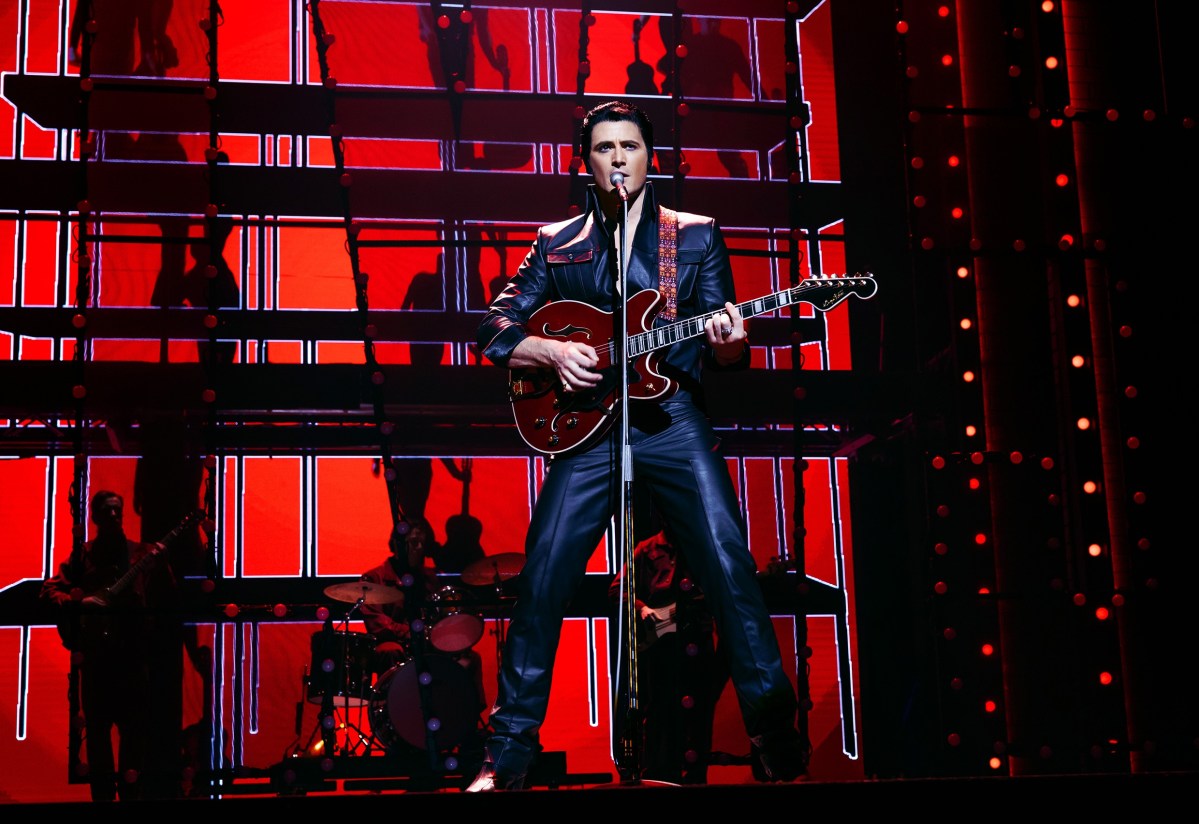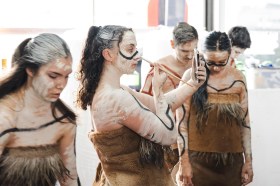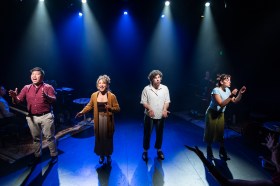With Elvis: A Musical Revolution opening at the Athenaeum and Abba’s Mamma Mia! kicking off its current run at the Princess Theatre on the same night, this weekend was all about musical theatre inspired by rock and pop icons in Melbourne. All we needed was a new production of We Will Rock You bumping Moulin Rouge out of the Regent and we’d have had the trifecta.
As it is, seeing both Elvis and Mamma Mia! within a couple of days of each other, it’s hard not to compare the two.
The big difference of course is that Mamma Mia! doesn’t tell the rags to riches story of Agnetha, Anni-Frid, Benny and Björn, but is a stand-alone show featuring their songs, while telling the, admittedly, fairly thin story of a single mother, her grown-up daughter and the three men, one of whom may be her father, all converging on an idyllic Greek island for the grown-up daughter’s nuptials.
After numerous theatrical productions and a wildly popular film (plus sequel), you may have thought that much would surely be common knowledge by now. Although the delighted squeals and surprised screeches from one particularly vocal member of the audience on opening night suggested this may not be so.
Like Mamma Mia!, Elvis: A Musical Revolution features scores of deadset classic hits but rather than ‘The Name of the Game’ and ‘SOS’, we have ‘Suspicious Minds’ and (plenty of) ‘Trouble’. While there is only a slight crossover in eras (the mid 70s) all of these songs are imprinted in our cultural DNA. You may have no idea where or when you first heard ‘Can’t Help Falling in Love’ or ‘Dancing Queen’, but they will be as familiar to you as breathing. They just are. And that means whatever you think about either of these shows, if you don’t come out humming at least half a dozen of the tunes, well, you’d be an anomaly, to say the least.
Where Elvis: A Musical Revolution completely differs, of course, is in the book. This is a piece of musical theatre that tells the by now familiar tale of the young, poverty-stricken, mother-loving truck driver from Tupelo, Mississippi, who grew up to become the King of Rock ‘n’ Roll. And it’s a title he’s yet to relinquish, despite it now being 46 years since his tragically early demise. The enduring potency of his legacy is clear to all – witness the hordes that descended on Bendigo for the Elvis: Direct from Graceland exhibition last year, or the resounding success of Baz Luhrmann’s biopic, grossing US$288 million worldwide.
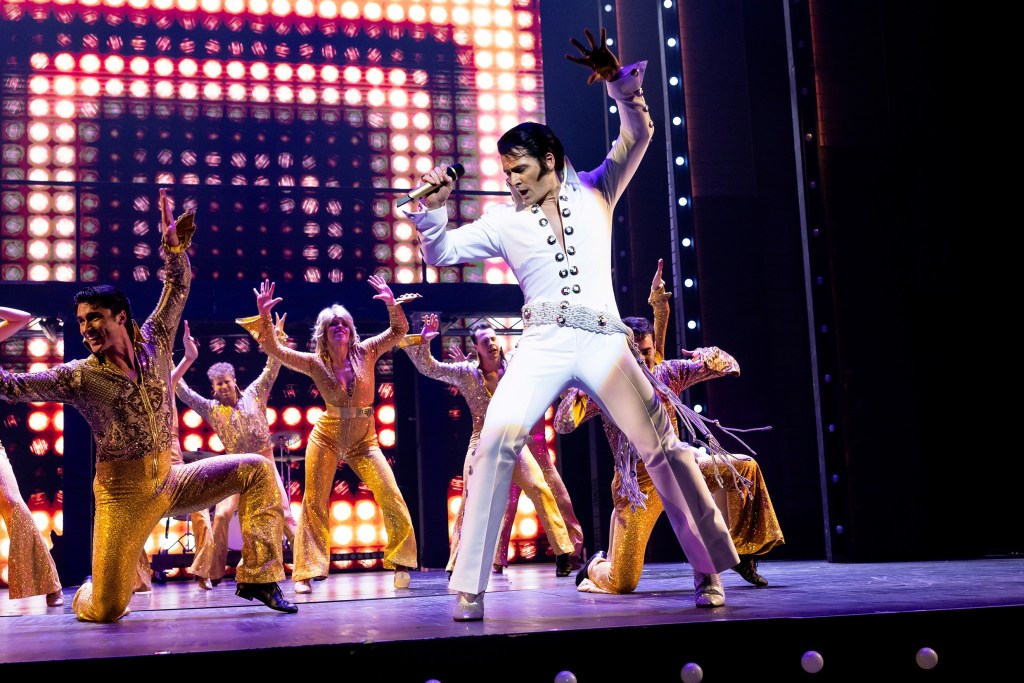
And the popularity of this new show, which premiered in Sydney in August and has already announced two extensions for its Melbourne run, is further testament to this. It should be said, however, that while the show is new, the idea is not. Way back in 1977 Ray Cooney and Jack Good rolled out the hugely successful jukebox musical Elvis, which ran for two years in London’s West End and was restaged nearly 20 years later, touring for another four years.
Read: 2023 Oscar nominations: Elvis and all the other hopefuls
What’s different about Sean Cercone and David Abbinanti’s take on the tale? For a start it finishes on a high – culminating in that glorious triumph that became known as the ’68 Comeback Special, although curiously it doesn’t include one of the most powerful moments of that TV show, ‘If I Can Dream’. It’s certainly a hard song to sing – Elvis looked and sounded entirely spent after its closing notes in the Special. But its exclusion points to one of the show’s weaker aspects. The song was written overnight in June 1968 by Billy Goldenberg and lyricist Walter Earl Brown to replace the intended finale of the Special. Elvis had been hugely affected by the assassinations of Bobby Kennedy (6 June) and, especially, Martin Luther King (4 April) and the song was a direct response to the murders and an attempt to convey his feelings about them – its similarities to King’s ‘I have a dream’ speech are no coincidence.
Elvis: A Musical Revolution, like Luhrmann, stresses how Elvis’ sound was inspired and shaped by gospel and other Black music forms, which is commendable, but King’s death is announced as almost a throwaway line. And skating somewhat over the issue of race is not the only time the show loses impact. This is a musical – it could be argued it’s not the time and place for a deep dive into some of the more problematic areas of Elvis’ legacy, but this reviewer couldn’t have been the only person in the audience watching Elvis (Rob Mallett) during his army service in Germany kissing Priscilla (Annie Chiswell) and wanting to shout at the stage, ‘She’s a child!’ (Elvis’ military two-year career began when he was 23 and she just 13).
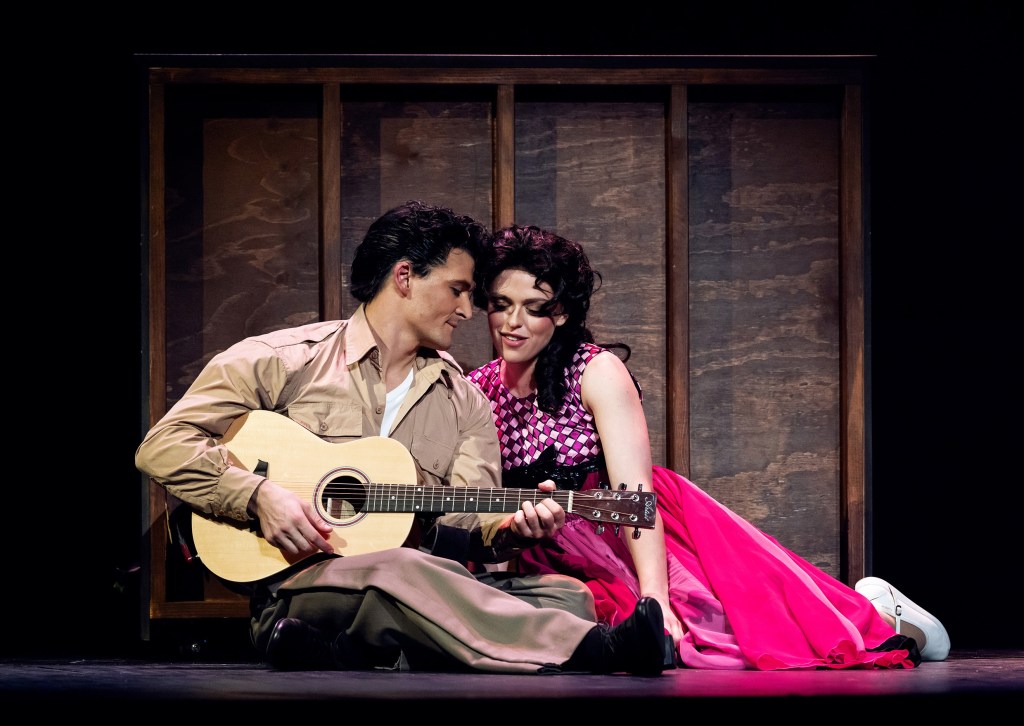
On the other hand, there are some neat devices, such as the recurring presence of young Elvis (played by a range of child actors), although the one performing when this reviewer attended could benefit from a little assistance in the projection and articulation departments.
And there are some witty and exuberant sequences. Kirby Burgess nails her Ann-Margret (misspelled as Ann-Margaret in the website’s cast list, which also recommends audiences get their ‘blue suade shoes’ ready – ahem) segment, though to be anything less than wonderfully vivacious in that role would be an insult to the original. The choreography from Michael Ralph is joyful and sharp, and director Alister Smith mines some comedy gold out of the conveyor belt of increasingly tired and uninspired movies Elvis made throughout the 60s.
The staging too is effective – with a mostly bare stage transformed by clever lighting courtesy of Declan O’Neill, the odd whisked-in piece of set or prop and some fake proscenium arc surrounds embellished with the make-up mirror lighting effect. And then there is that memorable massive ‘ELVIS’ in red lights that was used to such tremendous effect in the ’68 Special and is equally well utilised here.
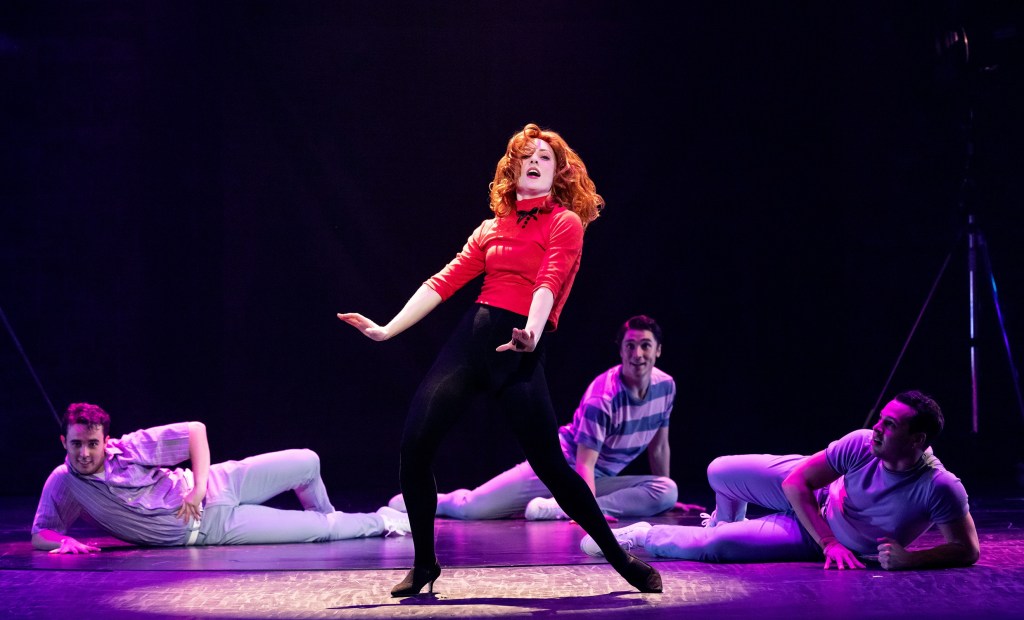
But no matter how good the dancers, the singers, Isaac Lummins’ costumes and all of the other component parts, a show about Elvis stands or falls on the central casting. And, despite the thousands out there making a good living out of performing in tribute acts (Parkes in NSW even has an annual festival), playing Elvis in a musical is a very, very difficult thing to pull off.
Read: Elvis was the original influencer
Elvis had a voice like no one else and he looked like no one else (though Austin Butler came pretty close on both counts in the Luhrmann film), but for this show Mallett has to sing, dance and act for the entire thing, with no breaks to recover in his trailer. He doesn’t really sound like the real man, certainly when it comes to Elvis’ unmistakeable timbre in his lower register, but he gets the pathos and most of the moves, and he does a fine job of highlighting the transition from small town boy to troubled star.
More than anything though, as with Mamma Mia!, this show is about the music. And Elvis: A Musical Revolution has just as many showstopping highlights as the magnificent version of ‘Does Your Mother Know’ (led by Deone Zanotto) in the Abba show. Examples include ‘Blue Suede Shoes’ during the army segment and the final rousing rendition of ‘Jailhouse Rock’ in the ’68 Comeback Special.
These numbers are simply timeless. And that means a good time is all but guaranteed.
